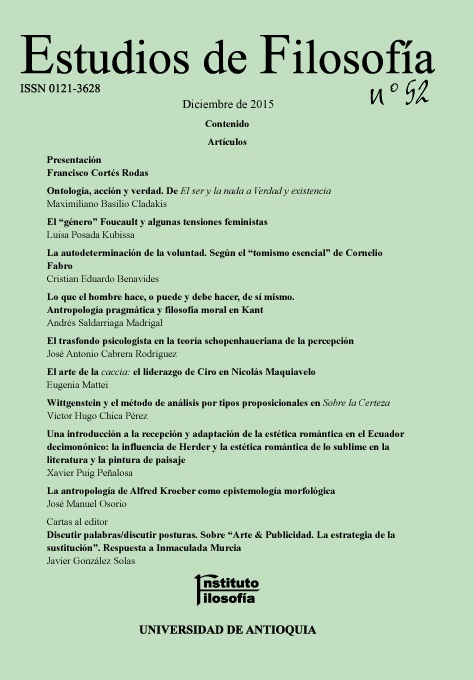“Gender”, Foucault and some feminist tensions
DOI:
https://doi.org/10.17533/udea.ef.n52a03Keywords:
feminist subject, feminist criticism, Foucaultian feminism, Gender, dispositive of sexualityAbstract
It seems quite clear that Foucaultian analyses are of interest to critical-feminist theorization. Notwith- standing, this reflection presents the tensions that are produced in terms of concepts such as “gender” or the feminist subject. These tensions occur when the Foucaultian discourse becomes a paradigm of the aforementioned theorization. By setting off primarily from The Will to Knowledge I will suggest here that this theoretical path could lead the feminist thought to an impasse. An impasse where the theorization about the transformation of the conditions of submission of the female sex, its structure as a revolutionary agent of an emancipating process, and the application of the analytical tools (like the category “gender”) that feminist thought has been developing toward all become unfeasible. To sum up, as Alcoff states, we could be facing the threat of “destroying feminism” itself.
Downloads
References
Alcoff, L. (1988). Cultural feminism versus post–structuralism: The identity crisis in feminist theory. Signs. 13 (3), 405–436
_______. (1990) Feminism and Foucault: the Limits to a Collaboration. En: Dallery, A. y Scott, C. (Eds.). Crisis in Continental Philosophy, New York, State University of New York Press, pp. 69–86.
Amigot Leache, P. y Pujal i Llombart, M. (2006). Ariadna danza: lecturas feministas de Foucault. Athenea Digital. (9), 100–130.
Benhabib, S. (2005) Feminismo y postmodernidad: una difícil alianza. En: Amorós, C. y de Miguel, A. (eds.). Teoría feminista: de la Ilustración a la globalización. Vol. 2, Madrid, Minerva, pp. 319–342.
_______. (2006) El ser y el otro en la ética contemporánea. Feminismo, comunitarismo y posmodernismo, Barcelona, Gedisa.
Braidotti, R. (1991) Patterns of dissonance: A study of women in contemporary philosophy, New York, Routledge.
Burgos, E. (2008) Qué cuenta como una vida. La pregunta por la libertad en Judith Butler, Madrid, A. Machado Libros.
Butler, J. (2007) El género en disputa. El feminismo y la subversión de la identidad, Barcelona, Paidós.
Foucault, M. (1991) Saber y verdad, Madrid, La Piqueta.
_______. (2009) La voluntad de saber, Madrid, Siglo XXI.
Fraser, N. (1981) Foucault on Modern Power: Empirical J Insights and Normative Confusions. Praxis International. (1), 272–287.
_______. (1997) Iustitia Interrupta. Reflexiones críticas desde la posición “postsocialista”, Bogotá, Siglo del Hombre Editores.
Fuss, D. (1989) Essentially speaking: Feminism, nature and difference, London, Routledge.
Harstock, N. (1987) Rethinking Modernism: Minority vs. Majority Theories. Cultural Critique. (7), 187–206.
_______. (1990) Foucault on Power. En: Nicholson, L.J. (ed.). Feminism and Postmodernism, New York, Routledge, pp. 152–172.
Millett, K. (1995) Política sexual, Madrid, Cátedra.
Molina Petit, C. (2000) Debates sobre el género. En. Amorós, C. (ed.). Feminismo y Filosofía, Madrid, Síntesis, pp. 255–284.
Oliva Portolés, A. (2005) Debates sobre el género. En: Amorós, C. y de Miguel, A, (eds.). Teoría feminista: de la Ilustración a la globalización. Vol. 3, Madrid, Minerva. pp. 13–60.
Posada Kubissa, L. (2012) Sexo, vindicación y pensamiento. Estudios de teoría feminista, Madrid, Huerga y Fierro.
Raab,H.(1998) Foucault undder feministische Post strukturalismus, Dortmund, Edition Ebersbach.
Rodríguez Magda, R. M. (1999) Foucault y la genealogía de los sexos, Barcelona, Anthropos.
Romero Pérez, R. (1996) En torno al pensamiento crítico: Michel Foucault y la teoría feminista, Madrid, Universidad Complutense de Madrid (Tesis doctoral inédita).
Sawicki, J. (1991) Disciplining Foucault: Feminism, Power and the Body, London, Routledge.
_______. (2012) Foucault, feminism and questions of identity. En: Gutting, G. (ed.). The Cambridge Companion to Foucault, Cambridge, Cambridge University Press, pp. 286–313.
Wittig, M. (2006) El pensamiento heterosexual y otros ensayos, Madrid, EGALES (2a).
Published
How to Cite
Issue
Section
Categories
License
Copyright (c) 2015 Luisa Posada Kubissa

This work is licensed under a Creative Commons Attribution-NonCommercial-ShareAlike 4.0 International License.
Authors who publish with this journal agree to the following terms:
1. The Author retains copyright in the Work, where the term "Work" shall include all digital objects that may result in subsequent electronic publication or distribution.
2. Upon acceptance of the Work, the author shall grant to the Publisher the right of first publication of the Work.
3. The Author shall grant to the Publisher a nonexclusive perpetual right and license to publish, archive, and make accessible the Work in whole or in part in all forms of media now or hereafter known under a Creative Commons Attribution-NoCommercia-ShareAlike (CC BY-NC-SA 4.0), or its equivalent, which, for the avoidance of doubt, allows others to copy, distribute, and transmit the Work under the following conditions: (a) Attribution: Other users must attribute the Work in the manner specified by the author as indicated on the journal Web site;(b) Noncommercial: Other users (including Publisher) may not use this Work for commercial purposes;
4. The Author is able to enter into separate, additional contractual arrangements for the nonexclusive distribution of the journal's published version of the Work (e.g., post it to an institutional repository or publish it in a book), as long as there is provided in the document an acknowledgement of its initial publication in this journal;
5. Authors are permitted, and Estudios de Filosofía promotes, to post online the preprint manuscript of the Work in institutional repositories or on their Websites prior to and during the submission process, as it can lead to productive exchanges, as well as earlier and greater citation of published work (see The Effect of Open Access). Any such posting made before acceptance and publication of the Work is expected be updated upon publication to include a reference to the Estudios de Filosofía's assigned URL to the Article and its final published version in Estudios de Filosofía.















